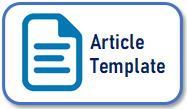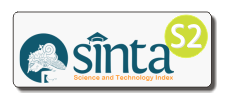Financial Distress and Indonesian Family Resilience during the COVID-19 Pandemic: A Case Study of a Muslim Family in Yogyakarta
DOI:
https://doi.org/10.14421/grieb.2023.111-06Keywords:
Family Resilience, Financial Distress, COVID-19Abstract
The objective of this study is to find evidence of the relationship between financial distress and family resilience and to examine the factors driving such family resilience in Indonesia during the COVID-19 epidemic. The study revealed some significant variables in family resilience, namely maintaining a positive outlook, family connectivity, and facing difficulties. Additionally, the study showed that certain variables had no significant effect on family resilience, such as family spirituality (SK), ability to understand difficulties (KMK), and financial pressure index (ITK). These findings document that family resilience is not solely caused by financial problems but is more based on psychological factors.
Originality/Value: This paper contributes to the development of theoretical aspects related to family resilience and financial inclusion.
References
Annas, S., Pratama, M. I., Rifandi, M., Sanusi, W., & Side, S. (2020). Stability analysis and numerical simulation of SEIR model for pandemic COVID-19 spread in Indonesia. Chaos, Solitons & Fractals, 139, 110072. https://doi.org/10.1016/j.chaos.2020.110072
Asyary, A., & Veruswati, M. (2020). Sunlight exposure increased COVID-19 recovery rates: A study in the central pandemic area of Indonesia. Science of the Total Environment, 729, 139016. https://doi.org/10.1016/j.scitotenv.2020.139016
Burgette, J. M. (2022). Family resilience and connection is associated with dental caries in us children. JDR Clinical and Translational Research, 7(1), 61–70. https://doi.org/10.1177/2380084420982250
Chew, J., & Haase, A. M. (2016). Psychometric properties of the family resilience assessment scale: A Singaporean perspective. Epilepsy & Behavior, 61, 112–119. https://doi.org/10.1016/j.yebeh.2016.05.015
Coyle, J. P., Nochajski, T., Maguin, E., Safyer, A., DeWit, D., & Macdonald, S. (2009). An exploratory study of the nature of family resilience in families affected by parental alcohol abuse. Journal of Family Issues, 30(12), 1606–1623. https://doi.org/10.1177/0192513X09339478
Deist, M., & Greeff, A. P. (2015). Resilience in families caring for a family member diagnosed with dementia. Educational Gerontology, 41(2), 93–105. https://doi.org/10.1080/03601277.2014.942146
Dioscoridi, L., & Carrisi, C. (2020). COVID-19 exposure risk for family members of healthcare workers: An observational study. International Journal of Infectious Diseases. https://doi.org/10.1016/j.ijid.2020.06.106
Goutte, S., Péran, T., & Porcher, T. (2020). The role of economic structural factors in determining pandemic mortality rates: Evidence from the COVID-19 outbreak in France. Research in International Business and Finance, 54, 101281. https://doi.org/10.1016/j.ribaf.2020.101281
Huber, C. H., Navarro, R. L., Womble, M. W., & Mumme, F. L. (2010). Family resilience and midlife marital satisfaction. The Family Journal: Counseling and Therapy for Couples and Families, 18(2), 136–145. https://doi.org/10.1177/1066480710364477
Isaacs, A. N., Enticott, J., Meadows, G., & Inder, B. (2018). Lower income levels in Australia are strongly associated with elevated psychological distress: Implications for healthcare and other policy areas. Frontiers in Psychiatry, 9, 536. https://doi.org/10.3389/fpsyt.2018.00536
Kaya, M., & Arici, N. (2012). Turkish version of shortened family resiliency scale (FRAS): The study of validity and reliability. Procedia - Social and Behavioral Sciences, 55, 512–520. https://doi.org/10.1016/j.sbspro.2012.09.531
Khan, A. H., Sultana, M. S., Hossain, S., Hasan, M. T., Ahmed, H. U., & Sikder, M. T. (2020). The impact of COVID-19 pandemic on mental health & wellbeing among home-quarantined Bangladeshi students: A cross-sectional pilot study. Journal of Affective Disorders, 277, 121–128. https://doi.org/10.1016/j.jad.2020.07.135
Kumar, A., Rani, P., Kumar, R., Sharma, V., & Purohit, S. R. (2020). Data-driven modelling and prediction of COVID-19 infection in India and correlation analysis of the virus transmission with socio-economic factors. Diabetes & Metabolic Syndrome: Clinical Research & Reviews, 14(5), 1231–1240. https://doi.org/10.1016/j.dsx.2020.07.008
Kye, B., & Hwang, S.-J. (2020). Social trust in the midst of pandemic crisis: Implications from COVID-19 of South Korea. Research in Social Stratification and Mobility, 68, 100523. https://doi.org/10.1016/j.rssm.2020.100523
Laing, T. (2020). The economic impact of the Coronavirus 2019 (Covid-2019): Implications for the mining industry. The Extractive Industries and Society, 7(2), 580–582. https://doi.org/10.1016/j.exis.2020.04.003
Li, T., Horton, R. M., Bader, D. A., Liu, F., Sun, Q., & Kinney, P. L. (2018). Long-term projections of temperature-related mortality risks for ischemic stroke, hemorrhagic stroke, and acute ischemic heart disease under changing climate in Beijing, China. Environment International, 112, 1–9. https://doi.org/10.1016/j.envint.2017.12.006
McBryde, E. S., Meehan, M. T., Adegboye, O. A., Adekunle, A. I., Caldwell, J. M., Pak, A., Rojas, D. P., Williams, B. M., & Trauer, J. M. (2020). Role of modelling in COVID-19 policy development. Paediatric Respiratory Reviews. https://doi.org/10.1016/j.prrv.2020.06.013
McDermott, B. M., Cobham, V. E., Berry, H., & Stallman, H. M. (2010). Vulnerability factors for disaster-induced child post-traumatic stress disorder: The case for low family resilience and previous mental illness. Australian and New Zealand Journal of Psychiatry, 44, 384–389. https://doi.org/10.3109/00048670903489916
Mikolai, J., Keenan, K., & Kulu, H. (2020). Intersecting household level health and socio-economic vulnerabilities and the COVID-19 crisis: An analysis from the UK. SSM - Population Health, 100628. https://doi.org/10.1016/j.ssmph.2020.100628
Nicola, M., Alsafi, Z., Sohrabi, C., Kerwan, A., Al-Jabir, A., Iosifidis, C., Agha, M., & Agha, R. (2020). The socio-economic implications of the coronavirus pandemic (COVID-19): A review. International Journal of Surgery, 78, 185–193. https://doi.org/10.1016/j.ijsu.2020.04.018
O’Connor, C. M., Anoushiravani, A. A., DiCaprio, M. R., Healy, W. L., & Iorio, R. (2020). Economic recovery after the COVID-19 pandemic: Resuming elective orthopedic surgery and total joint arthroplasty. The Journal of Arthroplasty, 35(7), S32–S36. https://doi.org/10.1016/j.arth.2020.04.038
Park, C. L., Russell, B. S., Fendrich, M., Finkelstein-Fox, L., Hutchison, M., & Becker, J. (2020). Americans’ COVID-19 stress, coping, and adherence to CDC guidelines. Journal of General Internal Medicine, 35(8), 2296–2303. https://doi.org/10.1007/s11606-020-05898-9
Pieh, C., Budimir, S., & Probst, T. (2020). The effect of age, gender, income, work, and physical activity on mental health during coronavirus disease (COVID-19) lockdown in Austria. Journal of Psychosomatic Research, 136, 110186. https://doi.org/10.1016/j.jpsychores.2020.110186
Power, M. C., Kioumourtzoglou, M. A., Hart, J. E., Okereke, O. I., Laden, F., & Weisskopf, M. G. (2015). The relation between past exposure to fine particulate air pollution and prevalent anxiety: Observational cohort study. BMJ, h1111. https://doi.org/10.1136/bmj.h1111
Singh, R. P., Kataria, R., & Haq, M. F. U. (2020). Letter to the editor in response to: COVID-19 pandemic and challenges for socio-economic issues, healthcare and national programs in India (Gopalan and Misra). Diabetes & Metabolic Syndrome: Clinical Research & Reviews, 14(5), 841–842. https://doi.org/10.1016/j.dsx.2020.06.019
Qian, Y., & Fan, W. (2020). Who loses income during the COVID-19 outbreak? Evidence from China. Research in Social Stratification and Mobility, 68, 100522. https://doi.org/10.1016/j.rssm.2020.100522
Ramadhana, M. R. (2020). A dataset for emotional reactions and family resilience during COVID-19 isolation period among Indonesian families. Data in Brief, 31, 105946. https://doi.org/10.1016/j.dib.2020.105946
Rocchi, M., Pelletier, L., Cheung, S., Baxter, D., & Beaudry, S. (2017). Assessing need-supportive and need-thwarting interpersonal behaviours: The interpersonal behaviours questionnaire (IBQ). Personality and Individual Differences, 104, 423–433. https://doi.org/10.1016/j.paid.2016.08.034
Ruisoto, P., Contador, I., Fernández-Calvo, B., Serra, L., Jenaro, C., Flores, N., Ramos, F., & Rivera-Navarro, J. (2020). Mediating effect of social support on the relationship between resilience and burden in caregivers of people with dementia. Archives of Gerontology and Geriatrics, 86, 103952. https://doi.org/10.1016/j.archger.2019.103952
Sadia, H., Srisatidnarakul, B., & Liaw, J. J. (2020). Exploring the experiences of flood-affected families to develop constructs and themes for family resilience assessment scale. International Journal of Disaster Risk Reduction, 46, 1–10. https://doi.org/10.1016/j.ijdrr.2020.101500
Sigala, M. (2020). Tourism and COVID-19: Impacts and implications for advancing and resetting industry and research. Journal of Business Research, 117, 312–321. https://doi.org/10.1016/j.jbusres.2020.06.015
Sixbey, M. T. (2005). Development of the family resilience assessment scale to identify family resilience construct. University of Florida.
Skinner, H., Steinhauer, P., & Sitarenios, G. (2000). Family assessment measure (FAM) and process model of family functioning. Journal of Family Therapy, 22(2), 190–210. https://doi.org/10.1111/1467-6427.00146
Stevenson, C., Costa, S., Wakefield, J. R. H., Kellezi, B., & Stack, R. J. (2020). Family identification facilitates coping with financial stress: A social identity approach to family financial resilience. Journal of Economic Psychology, 78, 102271. https://doi.org/10.1016/j.joep.2020.102271
Tancred, E. M., & Greeff, A. P. (2011). Gesinsaanpassing, ouerskapstyle en hanteringstrategieë in gesinne met kinders met ’n Aandagtekort/Hiperaktiwiteitsversteuring (AT/HV).
Tanoue, Y., Nomura, S., Yoneoka, D., Kawashima, T., Eguchi, A., Shi, S., Harada, N., & Miyata, H. (2020). Mental health of family, friends, and co-workers of COVID-19 patients in Japan. Psychiatry Research, 291, 113067. https://doi.org/10.1016/j.psychres.2020.113067
Tosepu, R., Gunawan, J., Effendy, D. S., Ahmad, L. O. A. I., Lestari, H., Bahar, H., & Asfian, P. (2020). Correlation between weather and COVID-19 pandemic in Jakarta, Indonesia. Science of the Total Environment, 725, 138436. https://doi.org/10.1016/j.scitotenv.2020.138436
Walsh, F. (1996). The concept of family resilience: Crisis and challenge. Family Process, 35(3), 261–281. https://doi.org/10.1111/j.1545-5300.1996.00261.x
Walsh, F. (1998). Strengthening family resilience. Guilford.
Walsh, F. (2016). Strengthening family resilience. The Guilford Press.
Ward, J. H. (1963). Hierarchical grouping to optimize an objective function. Journal of the American Statistical Association, 58(301), 236–244. https://doi.org/10.1080/01621459.1963.10500845
Yang, J., Zheng, Y., Gou, X., Pu, K., Chen, Z., Guo, Q., Ji, R., Wang, H., Wang, Y., & Zhou, Y. (2020). Prevalence of comorbidities and its effects in patients infected with SARS-CoV-2: A systematic review and meta-analysis. International Journal of Infectious Diseases, 94, 91–95. https://doi.org/10.1016/j.ijid.2020.03.017
Yezli, S., & Khan, A. (2020). COVID-19 social distancing in the Kingdom of Saudi Arabia: Bold measures in the face of political, economic, social and religious challenges. Travel Medicine and Infectious Disease, 101692. https://doi.org/10.1016/j.tmaid.2020.101692
Downloads
Published
Issue
Section
License

This work is licensed under a Creative Commons Attribution-ShareAlike 4.0 International License.
Global Review of Islamic Economics and Business is licensed under a
Creative Commons Attribution-ShareAlike 4.0 International License



















